#anti socialismo
Explore tagged Tumblr posts
Text
El Estado progresista hace política con la sexualidad de las personas y te impone una visión, su ideología, y si piensas lo contrario te etiqueta de 'discurso de odio' o 'negacionista' porque no quiere que pienses distinto...
@teatro-magico-solo-para-locos
#progresismo#anti progresismo#anti socialismo#woke#Estado#no a la ideología de género#pensador#discurso de odio#negacionismo#batalla cultural#libertad
18 notes
·
View notes
Text









✩ 𝒥𝑜𝓋𝑒𝓃 𝒞𝒽𝑒 ✩
#che guevara#ernesto guevara#anticapitalista#comunismo#socialismo#anti capitalism#historical#old photo
115 notes
·
View notes
Text

2 notes
·
View notes
Text

Fire in the system,fire in the bourgeoisie,fire in conservatives and moralists.
#femisnism#feelings#thoughts#words#writers on tumblr#photoblog#aesthetics#pretty girls#tumblr girls#girblogger#girlblogging#communism#socialismo#feminists#anti capitalism
6 notes
·
View notes
Text
I'm back from the international conference for peace in Rome,a beautiful event in which a lot of comrades from across the world took part. I'm a bit bitter about the fact that the Italian government refused the visto of a Hezbollah minister, thus making it impossible for me to interview him but oh well,nothing is perfect

#socialism#italian#sov posting#marxism leninism#marxist leninist#communism#marxist#marxismo#marxism#multipolar world#multipolarity#peace deal#peace#notizie#world news#italy news#notizia#socialismo#socialist#anti imperialist#anti imperialism
10 notes
·
View notes
Text
5 notes
·
View notes
Text
Everything about advertising is formed from previously established patterns. It sapped it's attention holding power from literacy and from symbolic imagery, long-standing human traditions, and now it sways the world.
#advertising#advertising is the devil#anti advertising#anti ads#marketing#anti marketing#comunismo#communism#socialismo#socialism
2 notes
·
View notes
Text

#anarquismo#anarquia#anarquista#antifascista#antifascismo#comunismo#comunista#socialismo#socialista#anarchism#anarchist#antifascist#anticapitalist#anticapitalism#antifascism#anarchopunk#anarchocommunism#anti fascist#anti fascism#anti-fascist#anti-fascism#anti-capitalist#anti capitalist#anti-capitalism#anti capitalism#anarcho communism#anarcho-communism#anarcho-communist#anarcho communist
0 notes
Note
Sr Bio, disculpa la pregunta y si no quiere hablar de ello no tiene que responder. Pero ayer empece a ver El Encargado con unas amigas gringas que me hicieron preguntas sobre la situacion economica argentina. Yo como venezolano, lo que reconozco es el dolor de la hiperinflacion, pero lo de Milei es, sinceramente, una puta locura. Como explico lo que pasa en argentina a unos gringos? Es explicable? Gracias de antemano si respondes. Ojala todo salga bien y que saquen a ese loco de la presidencia
Como explicar lo que pasa en la Argentina...

Pero voy a tratar, por vos de hacerlo lo más sencillo posible. No voy a pretender mucha neutralidad, pero voy a tratar:
Desde la independencia, el poder en la Argentina está concentrado en las clases agroexportadoras y burguesas conservadoras (lo que los peronistas llaman "la oligarquía"), que favorecen que Argentina sea un país agroexportador y conservador en línea con el mercado extranjero, en perpetuo conflicto con otras fuerzas que quieren la autodeterminación el progreso y la industrialización del país. Este conflicto se ha dado una y otra vez.
El más grande conflicto surge con la aparición del peronismo en los años 1940, un partido que promueve el nacionalismo, la justicia social, la expansión de los derechos sociales y políticos para todas las personas, el estado de bienestar, y el desarrollo del país.
El peronismo es un movimiento heterogéneo con ramas de izquierda y derecha. Desde su aparición ha sido el movimiento democrático más grande de Argentina, y ha sido opuesto por las fuerzas conservadoras, muchas veces por medio de golpes militares. El aforismo es que el peronismo es el movimiento más grande de Argentina y luego le sigue el anti-peronismo
Flash-forward a los 1990, en el plano de la caída del comunismo y el triunfo del neoliberalismo, el peronismo liberal de derecha traiciona sus ideales desarrollistas con el presidente Menem y el eterno ministro de economía Cavallo. Implementan una agenda neoliberal en línea con los "Chicago Boys" de privatización, desregulación, endeudamiento con el FMI, y una corrupción terrible.
Todo esto culmina en el desastroso gobierno de De La Rúa y la crisis de 2001, posiblemente una de las peores que ha visto este país. El colapso es total.
En este contexto surge el Kirchnerismo (ya vamos llegando a la actualidad), una rama del peronismo de izquierda encabezada por Néstor y Cristina Kirchner.
El Kirchnerismo es más bien de izquierda progresista alineado con el socialismo latinoamericano. Sus medidas llevan a la recuperación de Argentina y a lo que yo considero una de las mejores épocas del país, pero también atacan, o al menos esa es la percepción, a los privilegios de los agroexportadores y la clase media. Casos de corrupción y mala administración socavan su popularidad, y se genera una base anti-peronista en la clase media.
Tengo que aclarar acá algo: el odio que se generó contra el kirchnerismo es increíble. 3 canales de TV atacándolos constantemente. El fanatismo kirchnerista no ayuda, pero se crea una tremenda grieta entre la Argentina K y no-K (que si prestaste atención, viene de hace mucho)
En 2015, el liberal Macri gana las elecciones después de una década de kirchnerismo. Lo primero que hace, en líneas con su apoyo por parte del anti-peronismo, es deregular la economía y endeudarse con el FMI. Es un desastre. La economía se va a la mierda.
Macri dura 4 años. Alberto Fernández, siguiendo la línea de Cristina, lo sigue. Condicionado por el préstamo con el FMI, la pandemia de COVID-19 y con una incompetencia y una paja excepcional, el país entra en crisis de vuelta. A este punto, van años de crisis.
A todo esto, los medios conservadores de Argentina promueven más mensajes liberales, porque de vuelta; están para favorecer a la oligarquía agroexportadora. Encuentran un buen troll en el libertario ancap Milei. Ahí empieza el peligro. El mensaje extremista de Milei encuentra terreno fértil en los jóvenes (muchas estrategias de medios sociales). Es muy posible que todo el ambiente de la pandemia haya ayudado mucho a su mensaje.
En las elecciones, Alberto no compite. El peronismo postula a Massa, ministro de economía de centro-derecha, como candidato. La gente inmediatamente asocia a Massa y al peronismo con la crisis (sí, se olvidaron que Macri tomó deuda con el FMI).
Los medios siguen promoviendo más mensajes extremos: inseguridad fuera de control, peligros del comunismo, una historia falsa donde el peronismo es el culpable de todos los males del país hace 80 años, y muchas más. Eventualmente, Milei se escapa de la correa.
Milei acapara toda la atención. Finalmente, Macri y otros personajes de peso conservador lo apoyan.
Tras muchas idas y vueltas, es un mano a mano con Massa. Y los argentinos, que de vuelta, todo esto se rastrea a peronismo vs. antiperonismo, eligen por el antiperonismo, y eligen a Milei, sin importar sus propuestas, porque no es Massa.
Acá estamos.
158 notes
·
View notes
Text
Yo tolero
Tú toleras
Él tolera
Ella tolera
Nosotros toleramos
Ellos toleran
Vosotros tolerais
Los progres te censuran...
@teatro-magico-solo-para-locos
Pensador
#ideología progresista#intolerantes#progres#woke#anti comunismo#anti progresismo#anti socialismo#pensador#batalla cultural
18 notes
·
View notes
Text

I commenti da sinistra alla serie M che sto leggendo in giro sono francamente desolanti. C'è un punto storico che a quanto sembra non si vuole proprio vedere e che invece sia il libro sia la serie evidenziano in modo importante, ed è che Mussolini non si è fatto da solo, manco per niente. Mussolini è stato scelto, è stato scelto dallo Stato liberale, ed è stato scelto dal padronato dell'epoca, ed è stato scelto perché Mussolini aveva tradito il socialismo, nessuno meglio di un traditore poteva fare il loro gioco. Mussolini non sarebbe mai stato Mussolini se non avesse prima di tutto fatto carriera nel Partito socialista, di cui non era mica un galoppino qualsiasi ma un dirigente in esplosiva carriera, per poi tradirlo e diventare un fervente strumento dell'antisocialismo. Trovo un po' penoso sentir parlare di M soltanto attorno a Marinelli, che non fa altro che un lavoro spettacolare né più né meno, e non rispetto al grande valore di questa serie cioè sottrarre la figura di Mussolini al mito dei busti e delle effigi per rimetterla dove avrebbe sempre dovuto stare, nei processi storici, e farlo in modo popolare, non solo non accademico ma anti-accademico e dio solo sa quanto abbiamo bisogno di cultura anti-accademica in questo Paese. I processi storici son trattati fra l'altro in modo esteticamente interessantissimo dalla serie, perché la grande Storia è una Storia di scenari e in M gli scenari, quasi teatrali, sono di primaria importanza, esprimono le energie, e tutta la Storia umana è una storia innanzitutto di energie. Mussolini coi Fasci di combattimento non sarebbe arrivato da nessuna parte se non ci fosse stata una classe dominante che aveva bisogno della violenza organizzata per sedare le spinte rivoluzionarie fra le masse. E le spinte rivoluzionarie le spegni molto meglio se a trascinarti è l'odio, Mussolini era odiato fra le masse socialiste perché aveva tradito, e dunque le odiava, perché per loro c'erano in quel momento altre teste pelate da seguire, in una Russia vicina più che mai e che faceva tantissima paura, ai reazionari e non di meno ai riformisti di tutta Europa. Mussolini fu un anti Lenin a modo suo, la funzione storica che giocò fu esattamente quella. E fu anche uno come Mussolini ad aiutare un successivo traditore antiLenin di altra natura, come Josep Stalin, a portare avanti la causa dell'antisocialismo a sua volta. Il figlio del secolo è stato il figlio che si è messo al servizio delle esigenze controrivoluzionarie delle classi dominanti, in un'epoca in cui le masse erano in movimento, la borghesia che affollava il Parlamento le temeva, e solo attraverso la violenza si poteva obbligarle a cambiare direzione. Mussolini fu l'organizzatore di violenza più abile della prima metà del secolo in questo Paese. Il fascismo non ottenne consenso fra le masse, il fascismo ottenne consenso fra le classi dominanti, e poi alle masse si impose, non certo si propose. Qui sta il parallelo, l'unico a mio avviso seriamente pregnante, e di radicale attualità, con il presente. Parliamo di questo, per favore. Non lo esige la serie, lo esige il tempo in cui siamo. Esige decisamente qualcosa di più che commentucci sagaci e compiaciuti da posizioni molto più simili a quelle degli imbelli che obbedirono ai voleri di M a suo tempo, che non certo alla battaglia coraggiosa di Matteotti. Federica D’Alessio, Facebook
12 notes
·
View notes
Text
September 11, 1973: On the 50th Anniversary of the Coup in Chile
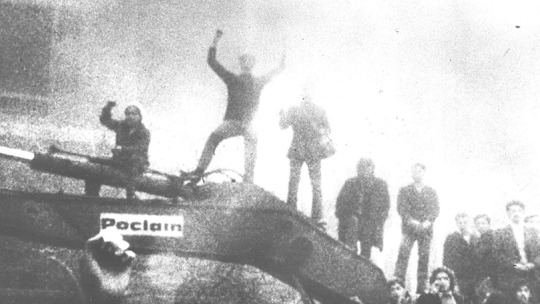
Today marks the 50th anniversary of the coup d’état in Chile, when a fascist junta led by dictator Augusto Pinochet overthrew the democratically elected socialist government of Salvador Allende. For those of us who are on the left, the story should be familiar by now: Allende had charted a ‘Chilean way to socialism' ("La vía chilena al socialismo") quite distinct from the Soviet Union and communist China, a peaceful path to socialism that was fundamentally anti-authoritarian, combining worker power with respect for civil liberties, freedom of the press, and a principled commitment to democratic process. For leftists who had become disillusioned with the Soviet drift into authoritarianism, Chile was a bright spot on an otherwise gloomy Cold War map.
What happened in Chile was one of the darkest chapters in the history of US interventionism. In August 1970, Henry Kissinger, who was then Nixon’s national security adviser, commissioned a study on the consequences of a possible Allende victory in the upcoming Chilean presidential election. Kissinger, Nixon, and the CIA—all under the spell of Cold War derangement syndrome—determined the US should pursue a policy of blocking the ascent of Allende, lest a socialist Chile generate a “domino effect” in the region.
When Allende won the presidency, the US did everything in their power to destroy his government: they meddled in Chilean elections, leveraged their control of the international financial system to destroy the economy of Chile (which they also did through an economic boycott), and sowed social chaos through sponsoring terrorism and a shutdown of the transportation sector, bringing the country to the brink of civil war. Particularly infuriating to the Americans was Allende’s nationalization of the copper mining industry, which was around 70% of Chile’s economy at the time and was controlled by US mining companies like Anaconda, Kennecott and the Cerro Corporation. When the CIA’s campaign of sabotage failed to destroy the socialist experiment in Chile, they resorted to assisting general Augusto Pinochet's plot to overthrow the democratically elected government. What followed was a gruesome campaign of repression against workers, leftists, poets, activists, students, and ordinary Chileans—stadiums were turned into concentration camps where supporters of Allende’s Popular Unity government were tortured and murdered. During Pinochet’s 17-year reign of terror, 3,200 people were executed and 40,000 people were detained, tortured, or disappeared, 1,469 of whom remain unaccounted for. Chile was then used as a laboratory for neoliberal economic policies, where the Chicago boys and their ilk tested out their terrible ideas on a population forced to live under a military dictatorship.
It shatters my heart, thinking about this history. I feel a personal attachment to Chile, not only because my partner is Chilean (his father left during the dictatorship), but because I’ve always considered Chile to be a world capital of poetry and anti-authoritarian leftism. The filmmaker Alejandro Jodorowsky asks, “In how many countries does a real poetic atmosphere exist? Without a doubt, ancient China was a land of poetry. But I think, in the 1950s in Chile, we lived poetically like in no other country in the world.” (Poetry left China long ago — oh how I wish I’d been around to witness the poetic flowering of the Tang era!) Chile has one of the greatest literary traditions of the twentieth century, producing such giants as Bolaño and Neruda, and more recently, Cecilia Vicuña and Raúl Zurita, among others.

To commemorate the 50th anniversary of the coup, the Harvard Film Archive has been screening Patricio Guzmán’s magisterial trilogy, The Battle of Chile, along with a program of Chilean cinema. I watched part I and II the last two nights and will watch part III tonight. It’s no secret that I am a huge fan of Guzmán’s work, and even quoted his beautiful film Nostalgia for the Light in the conclusion of my book Carceral Capitalism, when I wrote about the Chilean political prisoners who studied astronomy while incarcerated in the Atacama Desert. Bless Patricio Guzmán. This man has devoted his life and filmmaking career to the excavation of the Chilean soul.
Parts I and II utterly destroyed me. I left the theater last night shaken to my core, my face covered in tears.


The films are all the more remarkable when you consider it was made by a scrappy team of six people using film stock provided by the great documentarian Chris Marker. After the coup, four of the filmmakers were arrested. The footage was smuggled out of Chile and the exiled filmmakers completed the films in Cuba. Sadly, in 1974, the Pinochet regime disappeared cameraman Jorge Müller Silva, who is assumed dead.
It’s one thing to know the macro-story of what happened in Chile and quite another to see the view from the ground: the footage of the upswell of support for radical transformation, the marches, the street battles, the internal debates on the left about how to stop the fascist creep, the descent into chaos, the face of the military officer as he aims his pistol at the Argentine cameraman Leonard Hendrickson during the failed putsch of June 1973 (an ominous prelude to the September coup), the audio recordings of Allende on the morning of September 11, the bombing of Palacio de La Moneda—the military is closing in. Allende is dead. The crumbling edifice of the presidential palace becomes the rubble of revolutionary dreams—the bombs, a dirge for what was never even given a chance to live.
#Patricio Guzmán#film#Chile#history#salvador allende#socialism#marxism#coup#coup d'etat#The Battle of Chile#revolution#cinema#fascism#communism#geopolitics#political economy#Cold War#chris marker#memory#neoliberalism#capitalism#politics
102 notes
·
View notes
Text
youtube
My channel.
Desconstruindo o sistema com visão crítica e sem filtros. Se você quer ver além da superfície,esse canal é pra você. Clique e acesse meu canal.
Este é meu canal pessoal,se você odeia esse sistema fodido e desgraçado talvez você goste,sei que assuntos como esses num Bostil de país como esse não fazem sucesso,o que faz sucesso aqui é futebol,carnaval,mulher gostosa e pelada,fofocas alheias e tantas outras futilidades. Coisas que exigem raciocínio,estudo e inteligência a maioria não gosta.
#sentimentos#reflexões#filosofia#sociologia#patriarcado#feminismo#escritoras#frases#political#anticapitalista#anti facist#pensadores#socialismo#comunismo#poetas#writers on tumblr#palavras#desigualdade#desigualdade social#Youtube#antifascismo#cristianismo
5 notes
·
View notes
Text
Photos from the immortal regiment of Rome,later in the day I will release an article about it and about the Odessa massacre
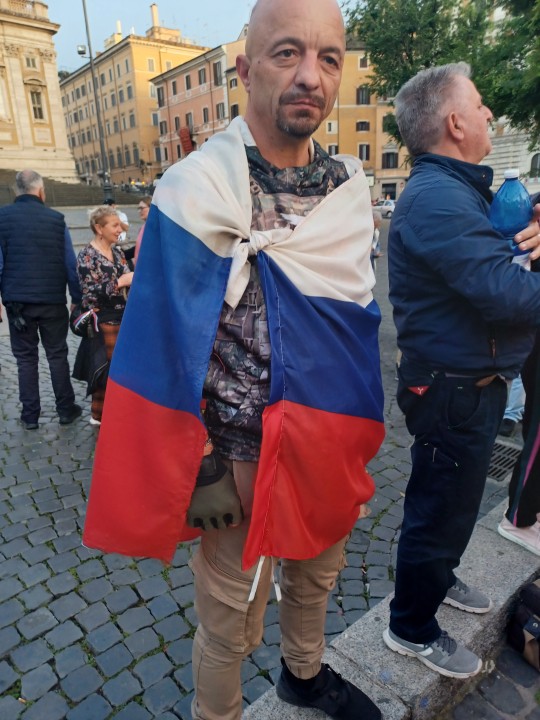
Veteran of aviidiivka and artevemosk,great guy, didn't manage to interview him unfortunately
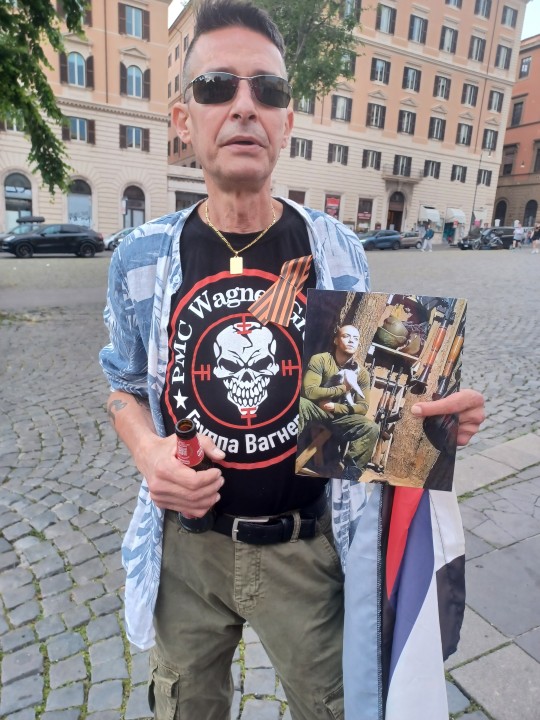
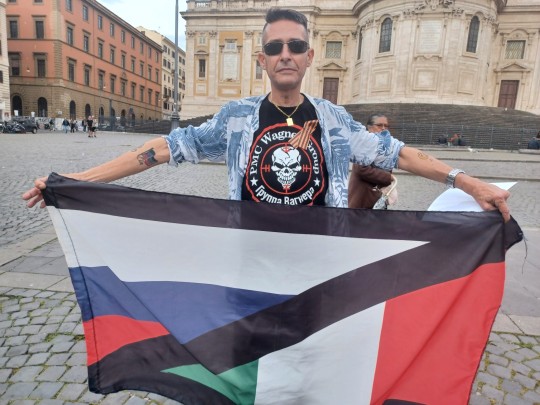
Father of an Italian volunteer who died in Donbass fighting the kiev junta, may his son rest in peace
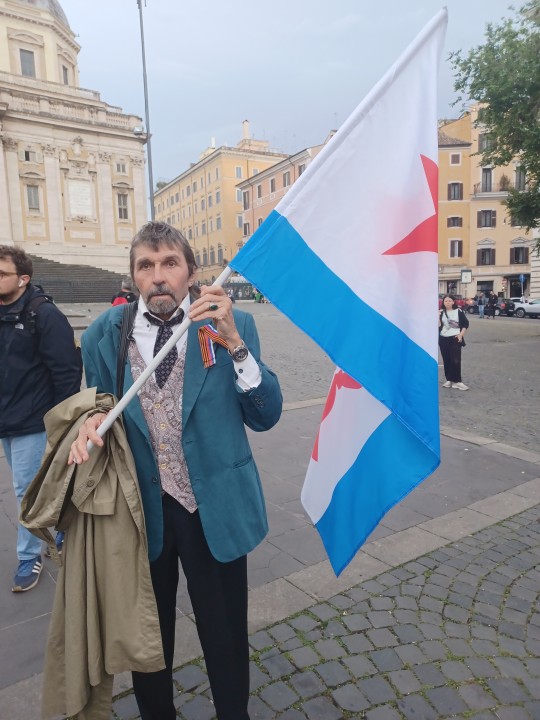
Count Antonov, his father fought in the great patriottic war as a sailor on a patrol boat. I kinda relate to him, I have a noble title just like him, and just like him, I'm a communist, I just wish I had such a heroic heritage as well
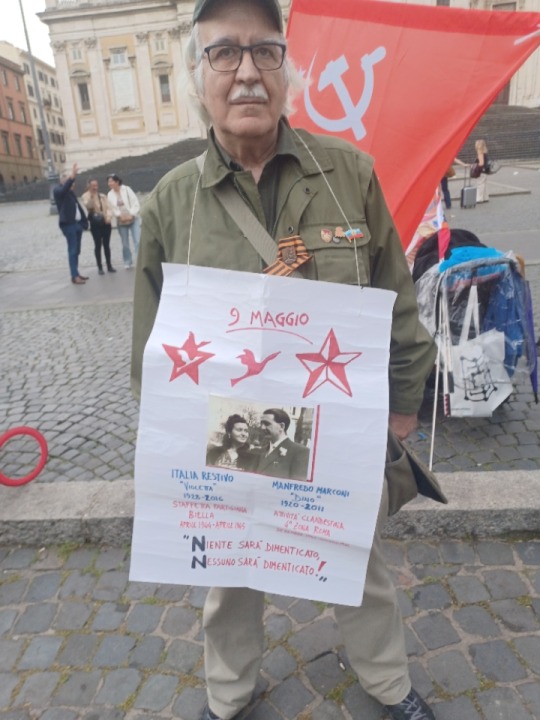
An Italian comrade remembering 2 family members who fought as partisans during the Second World War and the Italian liberation
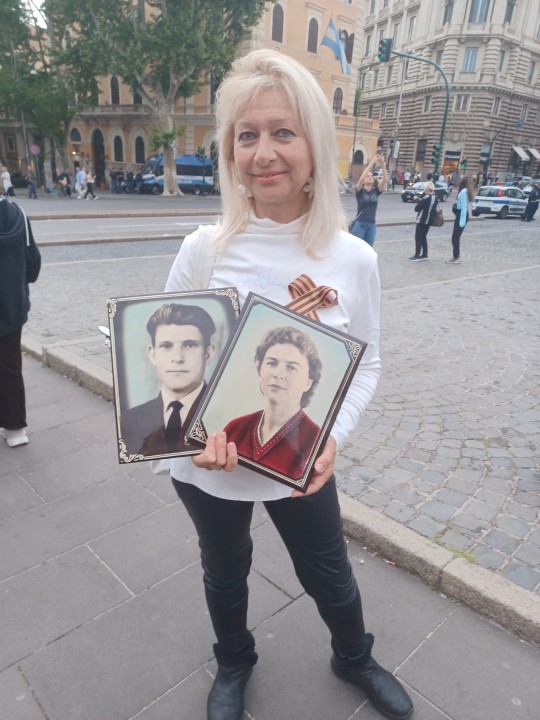
Unfortunately, among the many names I learned during the immortal regiment, I lost hers. However, I remember one thing she wanted me to stress. When her grandparents lived under the occupation in Odessa, they were so desperate for food that they had to eat tree leaves. Not much is known about said grandparents because they didn't want to tell their story after the war, but this one detail was told and she wanted me to tell it to you all
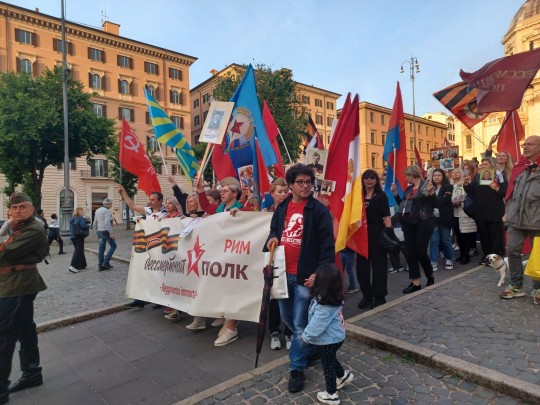
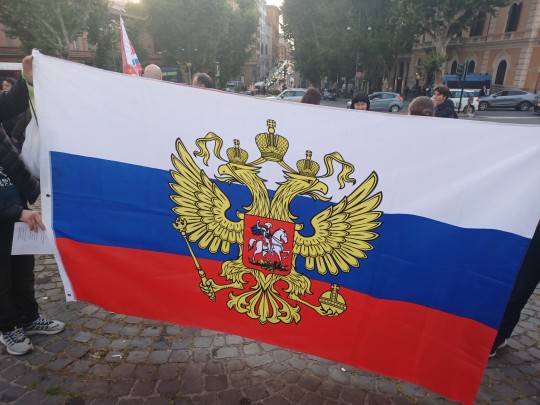
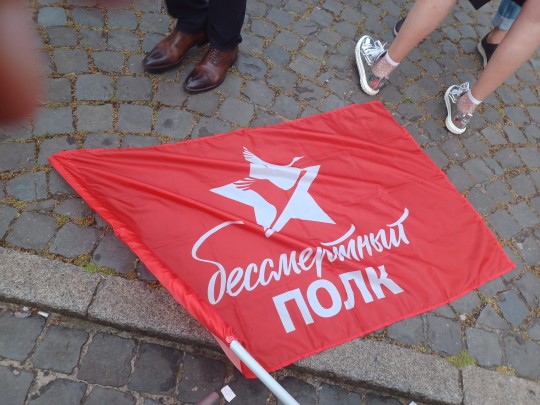
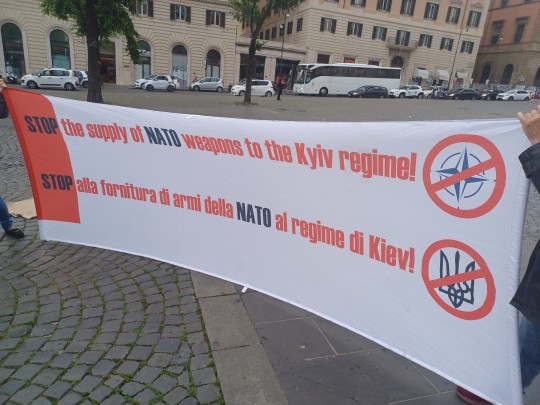
The immortal regiment marching, the original immortal regiment flag, the Russian flag with the coat of arms, and a slogan against the west support for the Ukraine war
#socialism#italian#italy#communism#marxism leninism#marxist leninist#marxist#russian federation#socialismo#socialist#marxism#multipolar world#multipolarity#9th of may#9 maggio#immortal regiment#italia#news#italy news#special military operation#russo ukrainian war#wagner group#anti imperialist#anti imperialism#history
3 notes
·
View notes
Text

#anarquismo#anarquia#comunismo#anarco comunismo#socialismo#socialismo libertário#anti capitalismo#capitalismo
9 notes
·
View notes
Text

Eine Liste linker, christlicher Bewegungen: Liberation Theology, Red Letter Christians, Christian Peace and Justice Movements (e.g. Pax Christi), The Catholic Worker Movement, Kairos Movement, Christians for Socialism (Cristianos por el Socialismo), Christian Socialist Movement (CSM), Industrial Areas Foundation (IAF), Worker Priests, The Progressive Christian Network, The Progressive Christian Network, Jesuit Social Justice Movements, Christian Anti-Capitalists, Ched Myers and the Bartimaeus Cooperative Ministries, Catholics for Choice, The Fellowship of Reconciliation, Black Liberation Theology, Network (Catholic Social Justice Lobby), Christen für gerechte Wirtschaftsordnung (CGW), Kirchliche Arbeitsstelle Südliches Afrika (KASA), Pax Christi Deutschland, Christliche Initiative Romero (CIR), Ökumenische Initiative Eine Welt (ÖIEW), Arbeitsgemeinschaft Christentum und Sozialismus (ACS), Katholische Arbeitnehmer-Bewegung (KAB), Kirche von unten (KvU), Erlassjahr.de, Attac Deutschland-Christliche Arbeitsgruppen, Katholische Arbeitnehmer-Bewegung (KAB), Arbeitskreis Christen in der SPD, Aktion Sühnezeichen Friedensdienste (ASF), Katholische Friedensbewegung Österreich, Evangelische Akademien in Deutschland, Forum kritischer Katholizismus.
2 notes
·
View notes